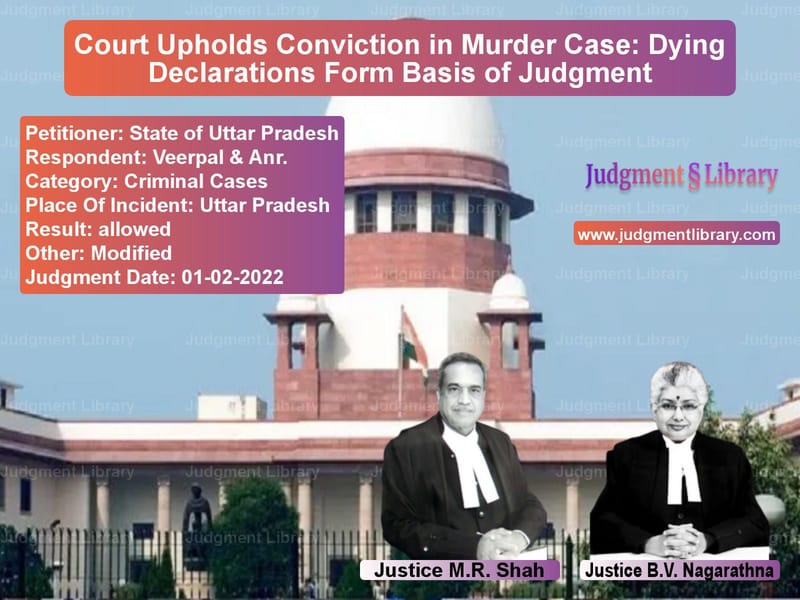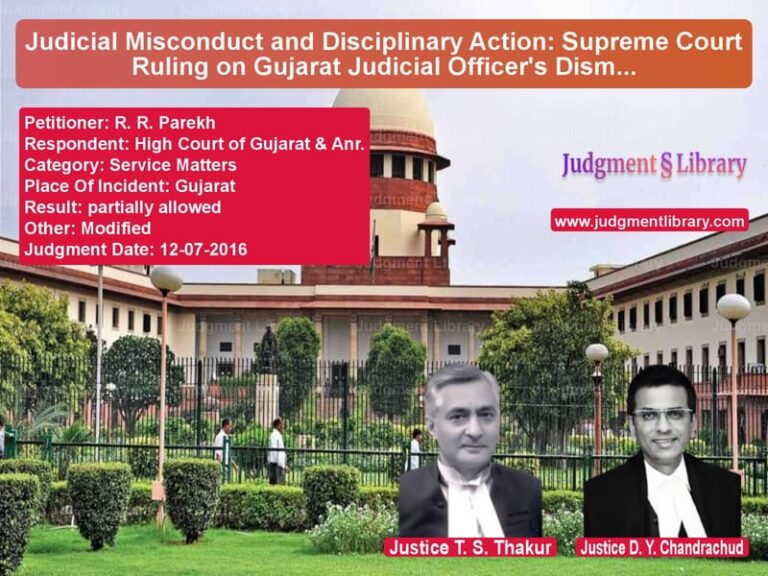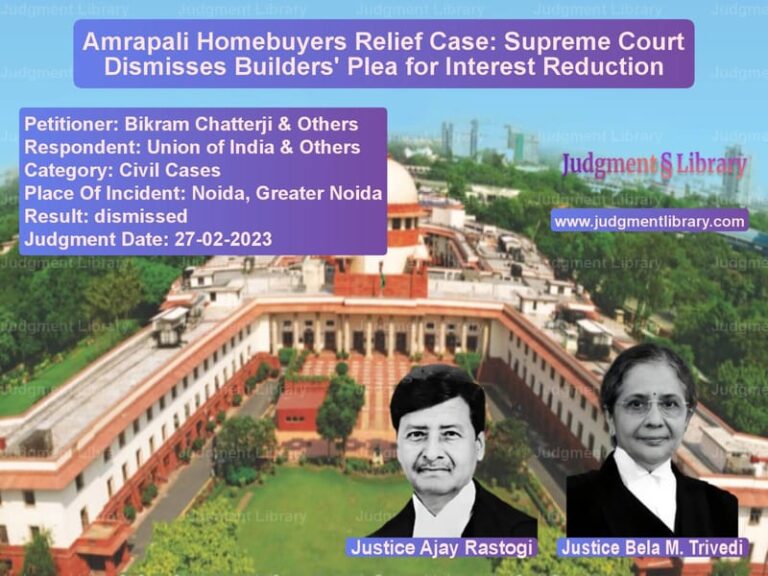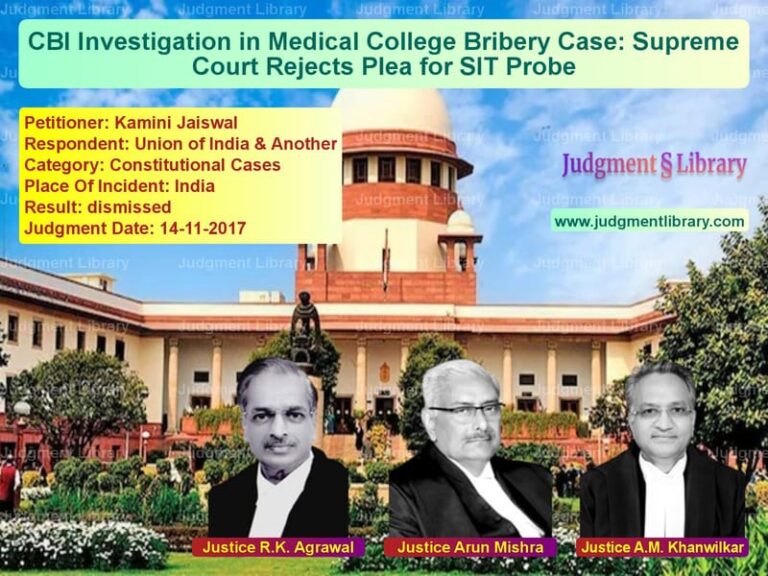Court Upholds Conviction in Murder Case: Dying Declarations Form Basis of Judgment
The case of State of Uttar Pradesh vs. Veerpal & Anr. deals with the legal implications of multiple dying declarations and the evidentiary value of such statements in a murder trial. The Supreme Court overturned the High Court’s acquittal of the accused and reinstated the conviction based on a dying declaration made by the deceased, which the Court found credible and sufficient to convict the accused under Section 302 read with Section 34 of the Indian Penal Code (IPC).
Background of the Case
The incident that led to this case occurred on December 20, 2011, when the deceased, Radha Devi, was allegedly set on fire by her in-laws after a dispute regarding money. The deceased was severely burned and managed to survive long enough to make two separate dying declarations. The first was recorded by the police on the day of the incident, and the second was recorded by a Magistrate two days later.
The initial First Information Report (FIR) was filed by Bengali Babu, the complainant, after he was informed by the deceased’s daughter that her mother had been severely burned by her father-in-law and mother-in-law over a monetary dispute. The investigation was carried out by the police, and a charge-sheet was filed against the accused under Section 302 (murder) and Section 34 (common intention) of the IPC.
Petitioner’s Arguments
The petitioner, representing the State of Uttar Pradesh, argued that:
- The dying declaration recorded by the Magistrate on December 22, 2011, should be accepted as the sole evidence against the accused.
- The first dying declaration made to the police on December 20, 2011, although recorded in compliance with the law, was inconsistent with the later statement.
- The Magistrate’s dying declaration should be given greater weight due to the formalities followed and the presence of the doctor who certified the victim’s state of consciousness.
- The High Court’s judgment was flawed because it dismissed both dying declarations without adequately examining the circumstances and medical evidence supporting the statements.
Respondent’s Arguments
The respondents, Veerpal and his wife, the accused, argued that:
- The dying declarations made by the deceased were inconsistent and contradictory. The first declaration did not name the accused as the perpetrators of the crime, while the second declaration made a complete change in the narrative, accusing the entire family.
- There was no corroborative evidence to support the dying declaration, making it unreliable as the sole basis for conviction.
- The deceased’s mental state was questionable due to her severe physical injuries, which could have affected her ability to make a truthful statement.
- The alleged motive for the crime (a demand for money) was not substantiated, and the accused should not be convicted on the basis of one person’s statements without supporting evidence.
Supreme Court’s Observations
The Supreme Court evaluated the evidence presented, especially the two conflicting dying declarations. The Court noted that while multiple dying declarations may be subject to scrutiny, they could still form the basis of conviction if:
“The declaration made by the deceased was truthful, and the circumstances surrounding the statement confirm its voluntary nature, free from external influence or coercion.”
The Court also observed that:
- The second dying declaration, recorded by the Magistrate, was more detailed and coherent than the first, which was recorded by the police.
- The Magistrate, being an independent officer, had no interest in the case, and his recording of the dying declaration was credible and trustworthy.
- The medical evidence confirmed that the deceased was conscious and able to understand the situation when the second dying declaration was recorded, making it more reliable.
- The first declaration, recorded by the police, did not name the accused, but this inconsistency could be explained by the shock the victim experienced in the aftermath of the traumatic event.
- Considering the evidence, including the medical testimony, the dying declaration recorded by the Magistrate held more weight.
Final Judgment
“The inconsistencies in the dying declarations are not significant enough to discredit the statements in their entirety. The dying declaration made to the Magistrate is reliable and corroborated by the medical evidence, which supports the narrative of the victim’s statement.”
The Court concluded:
- The appeal filed by the State is allowed.
- The acquittal of the accused is overturned, and the trial court’s conviction under Section 302 read with Section 34 IPC is restored.
- The accused are sentenced to life imprisonment with a fine of Rs. 10,000 each, as awarded by the Trial Court.
Implications of the Judgment
This ruling has important implications for the law surrounding dying declarations:
- It reaffirms the legality of dying declarations as a critical piece of evidence, particularly in cases of murder, where other evidence may be scarce or unavailable.
- The judgment provides clarification on the credibility of dying declarations, emphasizing the need to consider the context and the manner in which the statement is made.
- The case highlights the importance of medical evidence in corroborating a dying declaration and ensuring its reliability.
- It serves as a reminder that courts should carefully examine all dying declarations, even if they contain inconsistencies, in light of other supporting evidence.
Conclusion
The decision in State of Uttar Pradesh vs. Veerpal & Anr. underscores the importance of dying declarations in criminal cases, particularly in the absence of direct evidence. The judgment affirms that even conflicting statements can form the basis of conviction if the declarations are credible, voluntary, and supported by medical evidence. The ruling ensures that a truthful dying declaration can still lead to a conviction, offering protection to victims of violent crimes.
Petitioner Name: State of Uttar Pradesh.Respondent Name: Veerpal & Anr..Judgment By: Justice M.R. Shah, Justice B.V. Nagarathna.Place Of Incident: Uttar Pradesh.Judgment Date: 01-02-2022.
Don’t miss out on the full details! Download the complete judgment in PDF format below and gain valuable insights instantly!
Download Judgment: state-of-uttar-prade-vs-veerpal-&-anr.-supreme-court-of-india-judgment-dated-01-02-2022.pdf
Directly Download Judgment: Directly download this Judgment
See all petitions in Murder Cases
See all petitions in Bail and Anticipatory Bail
See all petitions in Judgment by Mukeshkumar Rasikbhai Shah
See all petitions in Judgment by B.V. Nagarathna
See all petitions in allowed
See all petitions in Modified
See all petitions in supreme court of India judgments February 2022
See all petitions in 2022 judgments
See all posts in Criminal Cases Category
See all allowed petitions in Criminal Cases Category
See all Dismissed petitions in Criminal Cases Category
See all partially allowed petitions in Criminal Cases Category







